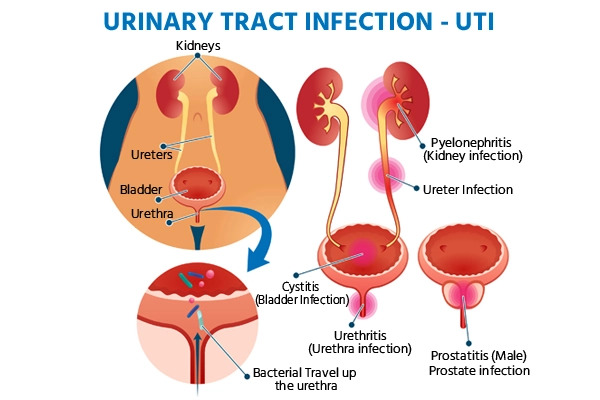What is Urinary Tract Infection?
Urinary tract infection is a type of infection that can occur in the urinary tract area of the body, bladder, kidneys and ureters. Infection basically occurs when various harmful microbes settle in the urinary tract area.
Inflammation may occur over time in this area where microbes settle, and these inflammations often occur in the lower urinary tract area. In cases where the inflammation resulting from a urinary tract infection affects the bladder, a person may experience cystitis. The incidence of this disease is quite high in people suffering from urinary tract infections.
Infections that occur in the lower urinary tract area, such as the bladder and urethra, generally do not cause great discomfort to the person and can be easily treated. Infections occurring in the upper urinary tract area follow a more dangerous course.
When the upper urinary tract is mentioned, the kidneys and the ureter channel, which provides the connection between the kidneys and the bladder, come to mind. When a urinary tract infection spreads to this area, diseases such as pyelonephritis may occur. These types of infections are quite serious and the patient must begin treatment without delay to prevent permanent damage to the kidneys.
Urinary Tract Infection in Women
Cystitis occurring in the lower urinary tract or bladder and pyelonephritis infections occurring in the kidney or upper urinary tract are urinary tract infections. This condition, which is more common in women, is caused by the fact that the length of the urethra is anatomically shorter than that of men.
This situation facilitates the ascent of bacteria and causes bacteria ascending to the bladder to cause cystitis, and bacteria ascending to the kidney to cause pyelonephritis.
Another reason for frequent urinary tract infections in women is the short distance between the anus and the urethra.
Conditions such as new sexual intercourse and previous urinary tract infection in women are risk factors for the formation of simple cystitis. Other risk factors are spermicide-coated condoms, diaphragms and spermicides.
Urinary Tract Infection in Men
Urinary tract infections are rare, especially in men between the ages of 15 and 50. Bacterial growth is less common due to the antibacterial content in the prostate fluid and the dryness of the urethra environment.
The risk of simple cystitis is higher in men who are not circumcised. The risk of urinary tract infection is higher in cases of structural or functional urinary tract abnormalities, neutropenia, or immunosuppression.
Urinary Tract Infection During Pregnancy
Urinary tract obstruction may occur in pregnant women. This situation is most common between the 5th and 7th months, when the abdomen becomes very swollen. As the pregnancy progresses, the uterus grows. And the growing uterus puts pressure on the bladder. Thus, the person’s risk of infection increases. Urinary tract infections that occur during pregnancy should be taken into consideration and their treatment should not be interrupted. Because, in rare cases, if left untreated, it may cause premature birth.
Urinary Tract Infection in Babies and Children
Urinary tract infections can also occur in babies and children. In the early stages, symptoms generally include restlessness, constant crying, fever, vomiting, blood in the urine and a different odor. The baby or child with these symptoms should be taken to the nearest health institution. A specialist doctor will support recovery as soon as possible with infection treatment appropriate for the baby or child.
What are The Types of Urinary Tract Infection?
Urinary tract infection (UTI) is the most common type of infection in the body caused by the development of bacteria.
Urinary tract infections are examined in two groups, simple and complicated, regardless of their type. Simple infections, which can usually be treated on an outpatient basis with the use of antibiotics, do not cause serious symptoms and can be treated in a shorter time.
The patient’s condition is worse in complicated infections where serious symptoms and complaints are observed. These patients are kept under surveillance in the hospital and the treatment process is carried out.
-
Urethritis:
The urethra is the tube that allows urine to be removed from the body. Urethritis is a condition in which the urethra becomes infected. It usually presents with urethritis, urethral discharge, burning, pain or discomfort during urination.
-
Cystitis:
It is a bladder (urinary bladder) infection. It occurs as a result of bacteria reaching the bladder and multiplying there. Cystitis presents with symptoms such as increased frequency of urination, burning sensation, pain, and cloudy or smelly urine.
-
Pyelonephritis:
It is an infection that affects the kidneys. It occurs when bacteria reach the kidneys and cause infection there. And it can manifest itself with symptoms such as significant back or side pain, fever, nausea, and vomiting.
The most common type of urinary tract infection is a bladder infection called “cystitis,” where bacteria usually travels through the urethra into the bladder, where it affects the bladder. Less commonly, urinary tract infections can spread to the kidneys.
-
Asymptomatic Bacteriuria:
Asymptomatic bacteriuria is a condition that does not cause any symptoms despite the presence of bacteria in the urine. It is usually seen in people who are prone to urinary tract disease or in cases that interfere with the urinary tract, such as a urinary catheter or urinary catheter.
What are The Causes of Urinary Tract Infection?
It can be said that the most common causes of urinary tract infections are bacterial infections, causes caused by lack of hygiene, or sexually transmitted infections.
Other main reasons are as follows:
-
Bacterial Infections:
Most urinary tract infections occur as a result of microorganisms entering the urinary tract. These bacteria usually pass from the urethra to the urinary tract and infect the bladder.
-
Wet Environments and Hygiene:
Wet environments such as pools, seas, baths and saunas, which are common areas, may increase the risk of infection. Additionally, not paying attention to genital area hygiene may pave the way for the growth of bacteria.
-
Sexual Intercourse and Partner Change:
The passage of bacteria from the urethra to the urinary tract during sexual intercourse can increase the risk of infection. Frequent partner changes may similarly increase the risk.
-
Use of Antibiotics:
Antibiotics can reduce beneficial bacteria in the body and allow harmful bacteria to grow. This may increase the risk of infection.
-
Diabetes and Fluid Intake:
Diabetes and inadequate fluid intake can increase the risk of urinary tract infection. Insufficient fluid intake may cause the urinary tract to not be adequately cleared.
What are The Symptoms of Urinary Tract Infection?
Symptoms of urinary tract infection usually occur as a result of E. coli bacteria in the intestines reaching the urinary tract and causing an infection. This bacteria can reach the urinary tract more easily, especially in women due to the short urinary tract.
-
Frequent Urination:
Increased need to urinate or frequent urge to go to the toilet.
-
Burning While Urinating:
Burning, pain or discomfort when urinating.
-
Change in Urine Color:
Abnormalities in urine color such as cloudiness, blood or haze.
-
Decrease in Urine Amount:
Passing out a small amount of urine despite urinating every time.
-
Abdominal Pain or Pressure:
Pain, pressure or discomfort in the lower abdomen.
-
Painful Sexual Intercourse:
Pain or discomfort during sexual intercourse.
-
General Weakness and Fatigue:
A general malaise, fatigue or mild fever due to a urinary tract infection.
-
Urinary Incontinence:
Especially in women, urinary tract infection can sometimes cause urinary incontinence problems.
How is Urinary Tract Infection Diagnosed?
Some tests are used to diagnose urinary tract infection. The structure of urine is normally sterile.
It does not contain fungi, viruses and bacteria.
Infection occurs in the organs when microbes in the digestive system enter the urinary tract and begin to multiply.
-
Urine Test:
It allows detecting bacteria (germs), bleeding, defense cells, urine properties and proteins in urine.
-
Cystoscopy:
It is an examination used by the physician to diagnose diseases such as bladder tumors, bladder/kidney stones and urinary tract inflammation.
-
Urine Culture:
It is one of the tests that helps diagnose the fungi and bacteria that cause infection and determines the appropriate treatment method.
-
Computed Tomography (CT):
It is an application that allows comprehensive imaging of the urinary tract with X-rays.
-
Bladder and Kidney Ultrasound:
It is a test performed with high-frequency sound waves that allows imaging of the bladder and kidneys in detail. It helps to control the presence of obstructions, masses, cysts and stones in the urinary tract that may lead to infection.
How to Treat Urinary Tract Infection?
Urinary Tract Infection is a health problem that can often be treated with simple measures.
Genital hygiene, fluid intake and antibiotic treatment are among the methods used to reduce the effects of infection.
It is possible to support a healthy life by examining the treatment and prevention methods of this infection.
Methods Used in the Treatment of Urinary Tract Infection
-
Genital Hygiene and Fluid Intake:
In simple urinary tract infections, especially infections that do not affect the bladder, it is important to pay attention to genital hygiene and consume plenty of fluids. These methods can help prevent the growth of germs.
-
Low Dose Antibiotics:
In mild urinary tract infections, short-term low-dose antibiotic treatment may be preferred. This treatment can help control the infection.
-
Septic Urinary Tract Infection Treatment:
Septic urinary tract infections affecting the kidneys or blood may require long-term antibiotic treatment. Depending on the patient’s condition, hospitalization and intravenous high-dose antibiotic treatments may also be applied.
-
Antibiotic Treatment: Effective Approach
Most urinary tract infections can be controlled with antibiotic treatment. Antibiotics work by neutralizing the germs that cause infection. Antibiotic treatment that lasts 3 to 7 days is generally appropriate for bladder infections.
Kidney infections may require longer treatment, even up to 2 weeks. In severe infections, hospitalization may be required.
Treatment Process and Recovery
Once antibiotic treatment begins, symptoms usually begin to ease within a day. However, it is important to complete the treatment. You must take antibiotics for the prescribed duration, otherwise the infection may reoccur. Pain medications can also be used when necessary to support the healing process. These medications can relieve pain and reduce the need to urinate.
What are The Practices That Are Good For Urinary Tract İnfection?
In addition to the treatment of urinary tract infection, the application of some methods helps relieve symptoms. It also has an accelerating effect on drug treatment. These methods include changes in nutrition and lifestyle.
- Consuming plenty of water to cleanse bacteria and dilute urine.
- Consuming foods such as kefir and yoghurt, which are rich in probiotics
- Do not squeeze to avoid frequent urination.
- Ensuring personal hygiene and cleanliness, cleaning from front to back after going to the toilet.
- Consuming foods containing vitamin C and drinking herbal teas such as green tea and thyme.
- Reducing caffeine-containing drinks such as tea and coffee and alcohol consumption.
- Reducing the pressure in the bladder by using an abdominal heating pad.
- Cleaning the genital area before and after sexual intercourse.
- Prefer cotton fabric when choosing underwear and avoid tight underwear.
- Not using soap to clean the genital area and changing pads frequently.






